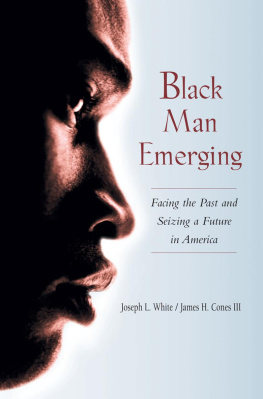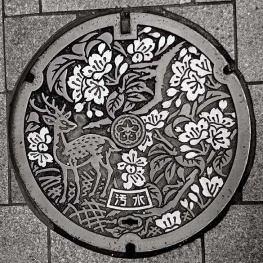MORE PRAISE FOR BLACK MAN EMERGING:
Black Man Emerging is a clear, balanced, and comprehensive report on Black men in America. Deftly weaving social science, social philosophy, and biographical stories, a sensitive and nuanced account of Black men emerges. It is an easy and compelling read and a valuable contribution to our understanding of Black men, and their understanding of themselves.
JAMES M. JONES, AUTHOR OF PREJUDICE AND RACISM
In this wide-ranging, emphatically positive account of what it means to be a black man in contemporary America, White and Cones provide a welcome antidote to discouraging headlines of violence and unemployment. Despite the inescapable complications of racism, most black men hold jobs, pay bills and taxes, and help raise kids. The authors' eloquent call for biracial dialogue offers a way to reduce the perceptual gap that denies this truth. Recommended for all collections.
CHOICE
[Black Man Emerging] is an important addition to the literature in Black Studies and Black Psychology. It is also an important contribution to the psychology of the African American male experience.
HALFORD H. FAIRCHILD, PITZER COLLEGE
This is a useful and intelligent synthesis of social-psychological factors pertaining to the African American male. Over the years, I have read a number of books evaluating aspects of the psychology of African Americans, and this book certainly occupies a place among the top contributors.
ROBERT V. GUTHRIE, PH.D.
The authors push aside all stereotypes and uncover Black men's undying will to succeed, and their desire to be considered equals in today's society. White and Cones have produced an accurate and clear analysis of the thoughts, feelings and perceptions of Black men as they emerge from the depths of oppression.
US BLACK ENGINEER AND INFORMATION TECHNOLOGY
Psychologists White and Cones go beyond social pathology statistics to consider the historical and psychological evolution of black men from the dawn of African civilization to modern times.
BOOKWATCH
Black Man Emerging
Facing the Past and Seizing a Future in America
Joseph L. White / James H. Cones III
ROUTLEDGE
NEW YORK / LONDON
Published in 1999 by
Routledge
Taylor & Francis Group
270 Madison Avenue
New York, NY 10016
Published in Great Britain by
Routledge
Taylor & Francis Group
2 Park Square
Milton Park, Abingdon
Oxon OX14 4RN
1999 by Joseph L. White and James H. Cones III
Routledge is an imprint of Taylor & Francis Group
Printed in the United States of America on acid-free paper
10 9 8 7 6 5 4 3 2
International Standard Book Number 0-415-92572-X (Softcover)
Library of Congress Card Number 99-31169
No part of this book may be reprinted, reproduced, transmitted, or utilized in any form by any electronic, mechanical, or other means, now known or hereafter invented, including photocopying, microfilming, and recording, or in any information storage or retrieval system, without written permission from the publishers.
Trademark Notice: Product or corporate names may be trademarks or registered trademarks, and are used only for identification and explanation without intent to infringe.
Library of Congress Cataloging-in-Publication Data
White, Joseph L., 1932-
Black man emerging : facing the past and seizing a future in America / Joseph L. White, James H. Cones III.
p. cm.
Includes bibliographical references and index.
ISBN 0-415-92572-X (pbk.)
1. Afro-American menPsychology. 2. United StatesRace relations. 3. RacismUnited StatesPsychological aspects. I. Cones, James H. II. Title.
E185.625.W46 1999b
305.38896073dc21
99-31169
Visit the Taylor & Francis Web site at http://www.taylorandfrancis.com
and the Routledge Web site at http://www.routledge-ny.com
T O THE BLACK MEN IN OUR LIVES who have lived in the purpose of creating viable, dignified masculine roles as friend, father, grandfather, husband, brother, uncle, cousin, nephew, son, coach, clergyman, and mentor, despite pervasive de facto and de jure racism in American society They toiled in the shadows of invisibility so we could finally emerge into the light and secure a clear presence in the future. They taught us pride in Blackness, how to keep the faith, and how to overcome the inevitable obstacles that young Black men face growing up in America. From our esteemed elders, we learned to improvise, create oportunities for ourselves and others, recover from setbacks, and renew the never-ending struggle for fair play, justice, and equality.
Especially to James H. Cones, Jr. (1933 ); James H. Cones, Sr. (19031982); Donnie Payton (19501995); Joseph L. White, Sr. (19071963); Robert W. Lee (19151985); and David J. Lee (1924 ).
Contents
Acknowledgement
We would like to express our thanks to a number of people who helped us along the way in the production of this book. First, we thank our spouses, Lois White and Brenda Stevenson Cones, for the patience, understanding, and support they provided during the many months it took to complete this project. Next, we take this opportunity to express appreciation to our secretaries, Edna Mejia and Cheryl Larsson, for their assistance in preparing the early and final drafts of the manuscript. We are especially grateful to those who read and critiqued the manuscript, Professors Robert Guthrie, Daryl Rowe, and Hal Fairchild, and to our editor, Melissa Wallerstein, who helped finetune what we wanted to say. We would like to thank Lissa Forehan-Kelly for her research assistance.
Joseph L. White
James H. Cones III
My partner in passion, Brenda Stevenson Cones, made sacrifices alongside me through the accomplishment this book represents. The sharing of our work and our love is refreshing play for my spirit. Our daughter, Emma Carrie Cones, the product of our passionsher gaze, filled with the wisdom of the Ancestors, continually reminded me of the importance of this work for our futures. The students in my classes as well as those who completed independent readings on race and gender participated with me in an exchange of mind and soul, bringing their lived experiences into our discussions and investigations. And my coauthor, Joseph L. White, the ultimate mentor, engaged me in hours and hours of gracious dialogue over the past five years. He validated my quizzical stirrings with the rich wisdom of his life.
James H. Cones III

Introduction
The prevailing image of Black men in America is an overwhelmingly negative one. As two Black men who have been subjected over the course of our lifetimes to the negative image recorded in history and statistics, and reported by the various news media, it is our hope to cast a new, more positive light on African-American masculinity.
Our Voices
In the chorus of negative reports and opinions, the voice of Black men themselves is rarely heard. While we acknowledge and sympathize with the oppression felt by other minority groups, and by our Black Sisters in particular, they are not the focus of this book. In the past ten years, the intensely negative view of Black men has far surpassed the disfavor in which other oppressed peoples are held. Black men have been typecast as Americas villains. It is our desire to show their true measure. We were taught by the Black men in our lives to carve out a positive template of Black male identity; we hope that this book will serve, in turn, as a message of hope to other Black menand as a lesson to society as a whole, so that people may not only better understand the individual Black man but also comprehend the challenges he faces in his life. It was this same spirit of hope, optimism, and rebirth that inspired the Million Man March.













